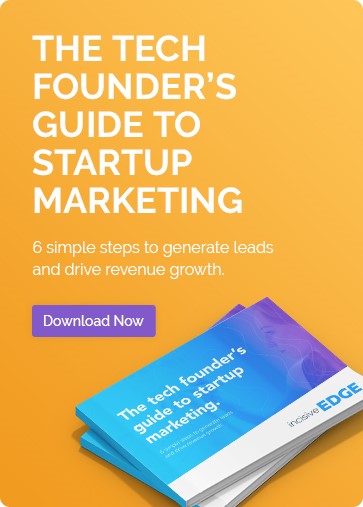In times of financial uncertainty, tech startups often face a knee-jerk reaction, hastily cutting costs and battening down the hatches to weather the storm. Unfortunately, this reactive approach frequently leads to the reduction of crucial elements like the marketing budget and talent. However, if you are genuinely committed to navigating these challenges successfully, here's why that typical response might be the least advisable. Instead, consider the strategic incorporation of an online platform, embracing the potential for rapid growth, and fostering a strong business idea. These elements collectively form a vital part of the comprehensive marketing strategy necessary for enduring and thriving in uncertain times.
Check out the following articles to learn more about tech startup marketing:
- 5 Steps to Achieve Marketing Success for Your Tech Startup
- 6 Steps to Accelerate Business Growth for Startup Marketers
- Startup Business Marketing: Improve Your Performance
Lost momentum and delay in rebuilding
Stopping all marketing activity means exactly that. Stopping any lead generation, brand awareness or strengthening of your customer relationships to support them during these uncertain times. Tech companies in their early stages cannot afford to cut these activities as their startup success depends on them. We don't know how long this period will last and what “normal” will look like on the other side, but by the time you've waited for that to play out, you've already lost any momentum you had. That is assuming your customers and target audience still remember that you exist by then.
Finding the right marketing expertise
When you are ready to focus on marketing again, you and/or your co-founder need to spend time considering the types of marketers you need (skill and aptitude) which can be time-consuming.
It's not just about finding someone technically capable; it's about finding people who are the right fit for your company at its current life cycle stage. If you no longer have any marketing expertise in-house, this task will be all the more difficult and time-consuming as you try to understand exactly what it is that enables businesses. Integrating strategic portfolio management and a clear startup idea into your hiring process is essential for securing individuals who align with your company's needs and contribute to sustained success.
Opportunities
Unfortunately, most of us don't have the luxury of sitting on our hands and waiting this out. Some startups may have enough funds provided by private and/or angel investors, but for the vast majority, that is not the case.
For our small businesses to survive, we need to push forward – but how do we do so while conveying sympathy and without appearing insensitive to what people are experiencing around us?
The answer is something you should have been using prior to any crisis - empathy.
Work closely with your team and put yourself in the shoes of your customer. Consider what it is that you would need right now?
Evolve and learn
The best marketers are continually learning, evolving, and reacting to the markets around them to meet the changing behaviours and needs of their target audience. Adapting to systems that successful large corporations use, as well as innovating with your technology, is no easy task. A huge shoutout to the marketers who have adjusted their strategies and tactics to better suit their audience's needs right now. Whether you like them or not, the airlines have done a fantastic job of this. Integrating effective risk management ensures a resilient approach to uncertainties while harnessing the power of cloud technology and leveraging cloud services becomes essential for maintaining agility and scalability in your marketing initiatives. These components collectively contribute to navigating challenges and ensuring sustained innovation in marketing practices.
Adopt a smart strategy
Review your existing marketing spend and results and consider redistributing budget to focus on your channels that are performing better right now. For example, reducing your events budget to reflect changing behaviours - from in person to virtual and allocating any remaining budget to running a supporting digital campaign.
If you find the need to trim your budget, it's prudent to focus on reducing marketing costs rather than eliminating them entirely. Channel your efforts into a few key channels or deliver a minimum viable (Marketing) product to keep your lead pipeline open and maintain momentum for future scaling. In addition, consider strategic approaches to raise funding, ensuring a sustainable future. Simultaneously, enhance your social media presence, leveraging it as a dynamic tool for visibility and connection. These comprehensive strategies not only contribute to financial resilience but also position your business for sustained growth and success.
Survival guide
Here are our thoughts on what you can be doing right now:
1. Optimise your website for lead generation
A lot of businesses are still open, so it’s important that you capture the interest of prospects and continue to manage your lead funnel. This is where a great marketing automation set up and lead nurture flows will really help you get ahead.
2. Don’t send that email
Don’t continue running your automated emails without reviewing and updating your email strategy and content first.
This is so important right now as what may have been important to your audience a few months ago may be of no importance now.
Make sure your content shows empathy and hits the spot of what your audience is currently experiencing. Oh, and remember, your target audience may not be commuting to and from an office these days, so update and test your email send times.
3. Use a blended team of inhouse experts and external specialists
This should be a key part of your strategy anyway to maximise your marketing dollars and achieve a great ROI.
Focus on developing an in-house marketing team capable of delivering the core aspects of your marketing strategy, especially within the dynamic landscape of the online platform. Complement their expertise by collaborating with adept freelancers and agencies, crucial for addressing areas where internal resources or bandwidth may be lacking. This collaborative model is especially vital during periods of rapid growth, ensuring adaptability and responsiveness to emerging opportunities.
Extend this strategic approach beyond marketing into the tech ecosystem, particularly if your business operates within the medtech sector. Explore partnerships that align with the objectives of your medtech company objectives and stay open to participating in a funding round for sustained growth. This comprehensive strategy positions your business at the intersection of marketing, technology, and financial viability, creating a robust foundation for success in the ever-evolving online business environment.
Working with external agencies and freelancers is a great way to benefit from specialist expertise and can deliver a greater ROI than hiring additional in-house resource as you will likely gain access to a wider range of skills than one person alone can offer.
4. Research SEO opportunities
Research indicates a significant drop off in paid search and SEO focused activities because many businesses have suspended these activities indefinitely.
Have you received some random adverts lately that you haven’t seen before?
This is a symptom of the lack of activity going on in paid search and advertising activities right now.
Previously, businesses with larger budgets who were able to focus on paid advertising had cornered the market making it difficult for smaller businesses to compete and gain visibility.
Do your keyword research and look for the opportunities present right now for your business to make a bigger impact with a smaller spend than previously possible.
5. Keep your campaigns simple
Let's bite the bullet and address the changes in the landscape of 'campaigns' over the past decade. Every company, especially a fintech company, seems to interpret what a campaign is slightly differently. However you define a campaign, it should consist of a series of activities, run over a finite period of time, specifically targeted towards a very particular target audience and end goal within the office space.
Campaigns don’t have to be elaborate and expensive, sometimes the simple ones are the best.
Think about what information is available to you (and what budget) and pull a campaign plan together that reflects this. A series of simple nurture emails can be very powerful when you have the right message and great copy.
6. Change up your events
Many businesses have leaned heavily on their in-person events plan. So, what do you do now that we can’t attend face to face events?
Bring the event online.
There is a great opportunity to reach an even larger audience than your events have ever done previously.
Suddenly you are no longer constrained by the huge costs of hiring event space and equipment etc. You can target as many people as you want (or as many people as your video conferencing software will allow 😉) and your audience won’t have to submit a business case for travel and expenses to attend your event. It really is win-win.
What’s more, you’ll have a video of the event that you can use as a marketing asset for further promotion and campaigns.
7. Put yourself in your customers’ shoes
Think about how you can support your customers better during this anxious time.
For example, can you offer them free access to your product for a month or provide them with further value-add services above and beyond your standard contract?
8. Be flexible
This isn’t an excuse to stop paying your invoices.
Be prepared to be flexible (if possible) regarding your costs and be considerate of how your clients and partners are faring.
Perhaps consider exchanging services if money is tight, such as providing expertise or writing a couple of blog posts for your client. In return, your client could provide a case study and testimonial to reduce their financial pressures.
Let’s support each other and get through this together.
Keep calm and carry on
Take this time to analyse, plan and prepare to come back stronger later in the year. This period will require you and your co-founders or team to be united. If you follow the steps and don't let the pressure get the best of you, it is very possible to obtain high growth.
It’s a great opportunity to reassess your goals, update and create content (if you can get the kids to focus on their home-schooling work long enough) and generate ideas and plans for execution later in the year.
Remember, you are doing a great job. Keep going - you’ve got this.
And most of all, stay positive. We will get through this.








